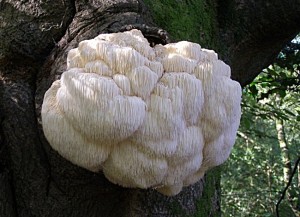Contributing Writer for Wake Up World
Easily grown at home, and a relatively inexpensive therapeutic food, lion’s mane is a beautiful mushroom with cascading spines instead of gills that shows potential in slowing the progression of neurological disorders — including Alzheimer’s and Parkinson’s disease. Research has also found the mushroom to be beneficial in treating symptomatic depression and anxiety associated with menopause.
The secret to the success of lion’s mane is due to abundant erinacines. These compounds enhance the production of nerve growth factor — a protein that encourages the regeneration of neurons. Additionally, the mushroom also protects against brain cell death, which is an important factor in both Alzheimer’s and Parkinson’s disease.
Another protective aspect involves the mushroom’s ability to deter the development of beta-amyloid plaque in the brain. Paul Stamets reports in “Lion’s Mane: A Mushroom That Improves Your Memory and Mood?”…
“The reduction of beta amyloid plaques in the brains of mushroom-fed mice vs. the mice not fed any mushrooms was remarkable. The formation of amyloid plaques is what many researchers believe is a primary morphological biomarker associated with Alzheimer’s. Plaques linked to beta amyloid peptide inflame brain tissue, interfere with healthy neuron transmission, and are indicated in nerve degeneration.”
Human studies appear promising as well. Research published in Phytotherapy Research discovered a positive correlation between the ingestion of lion’s mane and the improvement of cognitive impairment. In a double-blind, placebo-controlled trial, 30 test subjects between the ages of 50 and 80 with mild cognitive impairment, were given either 250 mg (96 percent lion’s mane powder) or a placebo, three times per day. At the conclusion of the 16-week study, the researchers found the mushroom to be “effective in improving mild cognitive impairment.”
Moreover, the mushroom helps ease issues related to menopause — such as depression, irritability, anxiety and insomnia. Researchers at Kyoto Bunkyo University observed 30 menopausal women who were given either lion’s mane or a placebo over the course of four weeks. The mushroom group reported a significant reduction in menopausal symptoms.
Easy ways to include lion’s mane in your day-to-day life
If you would like to try your hand at growing lion’s mane at home, do-it-yourself mushroom kits are a great place to start. Otherwise, the mushroom is becoming increasingly available at gourmet food stores or it can be taken as a supplement. Almost 20 percent protein — and tasting similar to lobster or shrimp — lion’s mane is an excellent vegetarian alternative to seafood. Lastly, Stamets suggests:
“Lion’s mane is best when caramelized in olive oil, deglazed with sake wine, and then finished with butter to taste. Lion’s mane can be bitter if not cooked until crispy along the edges. It takes some practice to elicit their full flavor potential.”
Sources for this article include:
- http://www.ncbi.nlm.nih.gov
- https://www.jstage.jst.go.jp
- http://www.huffingtonpost.com
- http://science.naturalnews.com
About the author:
I’m Carolanne — a writer, chef, traveler and enthusiastic advocate for sustainability, organics and joyful living. It’s good to have you here. If you would like to learn more, connect with me at Thrive-Living.net or visit Twitter.com/Thrive_Living.Please note: this article first appeared on Natural News.

If you've ever found value in our articles, we'd greatly appreciate your support by purchasing Mindful Meditation Techniques for Kids - A Practical Guide for Adults to Empower Kids with the Gift of Inner Peace and Resilience for Life.
In the spirit of mindfulness, we encourage you to choose the paperback version. Delve into its pages away from screen glare and notifications, allowing yourself to fully immerse in the transformative practices within. The physical book enriches the learning process and serves as a tangible commitment to mindfulness, easily shared among family and friends.
Over the past few years, Wake Up World has faced significant online censorship, impacting our financial ability to stay online. Instead of soliciting donations, we're exploring win-win solutions with our readers to remain financially viable. Moving into book publishing, we hope to secure ongoing funds to continue our mission. With over 8,500 articles published in the past 13 years, we are committed to keeping our content free and accessible to everyone, without resorting to a paywall.








